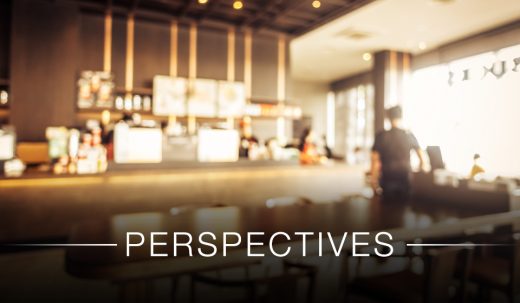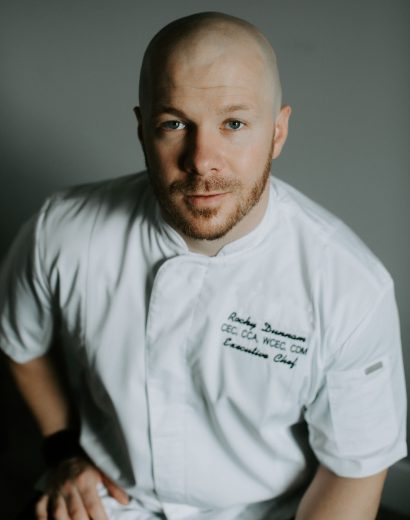
Perspectives is a short-form Q&A with culinary and hospitality professionals navigating the new landscape. Each week we’ll hear from different members of various communities about their experiences in the COVID era and how they are helping their business, customers and community move forward.
Today we have Chef Rocky Dunnam, executive chef of dining and nutrition services at MU Health Care at the University of Missouri. Chef Dunnam is a 2008 graduate of Le Cordon Bleu and has been in the industry for more than 15 years.
Chef Works: How have the last 10 weeks compared to your previous experience in the industry?
Rocky Dunnam: Much of what we do in our industry really focuses on sanitation, and those are also the keys to slowing/preventing the spread of COVID-19 (not unlike other viruses we are conscientious of).
The recommendations of hand washing, sanitizing surfaces, etc. is really a standard practice for us. The big difference that we are seeing is the guest/customer expectations in a “new normal” mode of operation. Guests are more aware now than ever about the hygiene from a service and delivery mechanism standpoint. In order to make our customers feel safe, we have had to go above and beyond our minimum standards to physically show sanitation practices.
The use of disposables are one area that we’ve spent years transitioning to a more sustainable, eco-friendly approach that eliminates plastics and foam.
Ironically, there is now a huge demand for single-use products. It’s going to continue to be a tricky issue moving forward in the education of customers that our reusable silverware, plate ware, etc. are sanitized and safe — often times more carefully than disposables, actually.
CW: What were some of the challenges hospital/healthcare chefs vs. other chefs in the industry?
RD: Healthcare Chefs normally face challenges not approached by commercial chefs. For example, we have several varied “diet” structures based on a single menu (ie. Low Concentrated Sweets for Diabetics, 2g Sodium Diet for Cardiac patients, or texture modifications like Mechanically-Altered Diets for oral issues).

These are challenges that we remedy every day, not just during a pandemic like this one. One thing that’s opposite though is traffic. In healthcare, we rarely have a low traffic/census concern. Many commercial chefs today are struggling to reach revenue projections because of quarantines, partial re-openings, etc. We don’t necessarily have the same concerns.
CW: What has the response been like from those you serve? Is it “just another day” or is there an extra sense of appreciation?
RD: Across America, we’ve seen a true outpouring of love and appreciation for healthcare in general, but specifically in food service. The frontline, essential food service personnel that often go unnoticed are still showing up and working every single day. And now that this pandemic has shown some light on that, recognition has followed.
I always tell my staff that they are some of the most important people on the planet at times like this, because we are feeding our patients out of necessity for nutrition and survival rather than for pure pleasure.
CW: What advice do you have for chefs/hospitality workers trying to transition back as the country starts to re-open?
RD: Take notice of the need for sanitation. It’s been an important cornerstone of our industry for ages, but now more than ever we must remain vigilant and meticulous in our efforts to provide a safe environment and produce a safe product. It’s like this pandemic hit a hard reboot of our system and drew attention to a very crucial aspect of food service that we must remain aware of.
If you work in any area of hospitality and are interested in being featured in Perspectives, email kgemmell@chefworks.com
ON THE BLOG: Some stories from the last couple of months
- Chef Works proudly launches SKILD SERIES™ face coverings (PRE-ORDER NOW!)
- As the world around us changed, Chef Works stayed focused on what matters.
- Super Bowl chef Dayanny De La Cruz is leading her own comeback story
- Chefs Allison Fasano and John Brill are masked heroes in Gotham.
- Our 20K Apron Giveaway was a resounding success.
- Guest column: How Nude Dude Food is paying it forward.
- Food critic, writer and TV personality Troy Johnson is hopeful for a “massive flood” of people at restaurants.
- A Q&A with New York Executive Pastry Chef Caroline Schiff.


